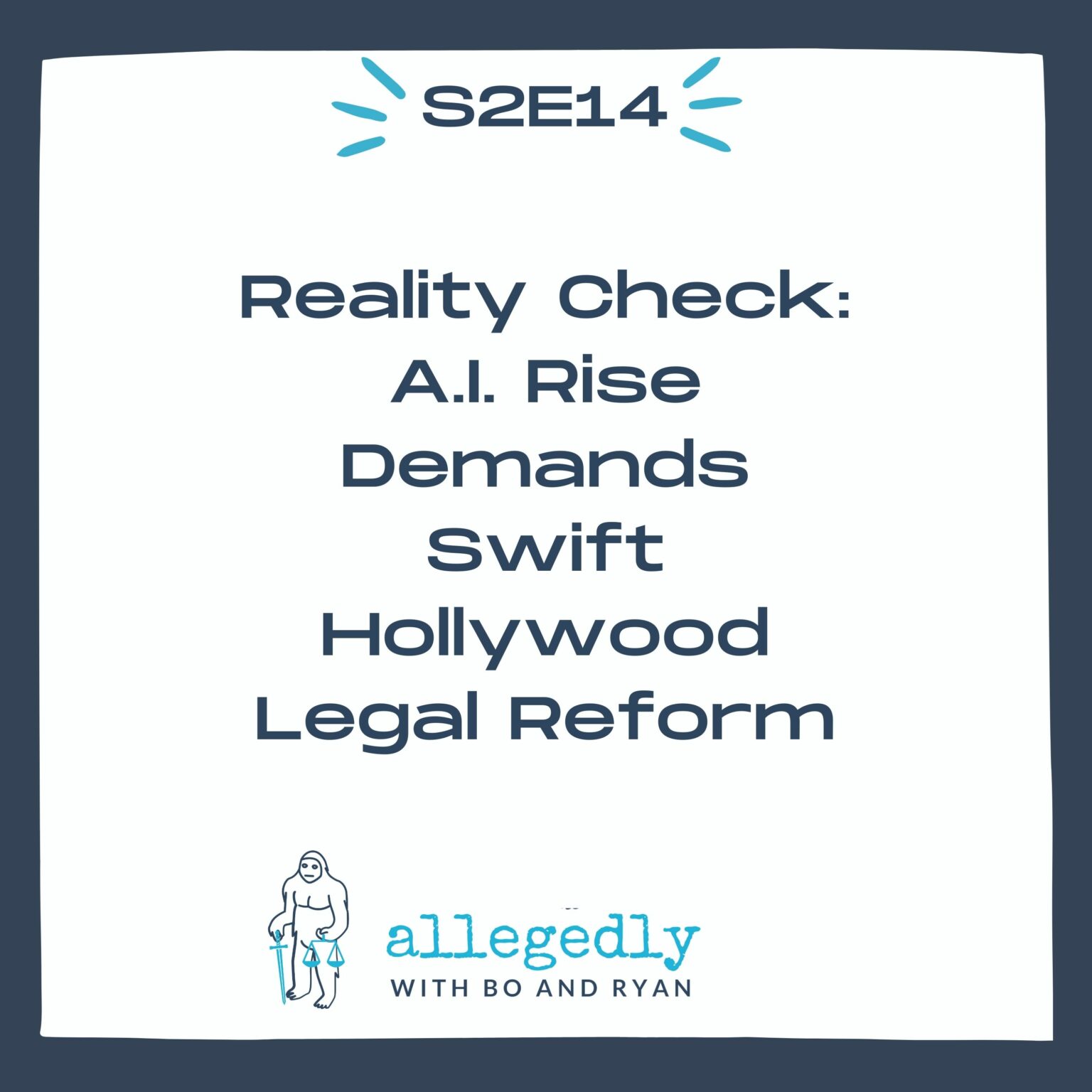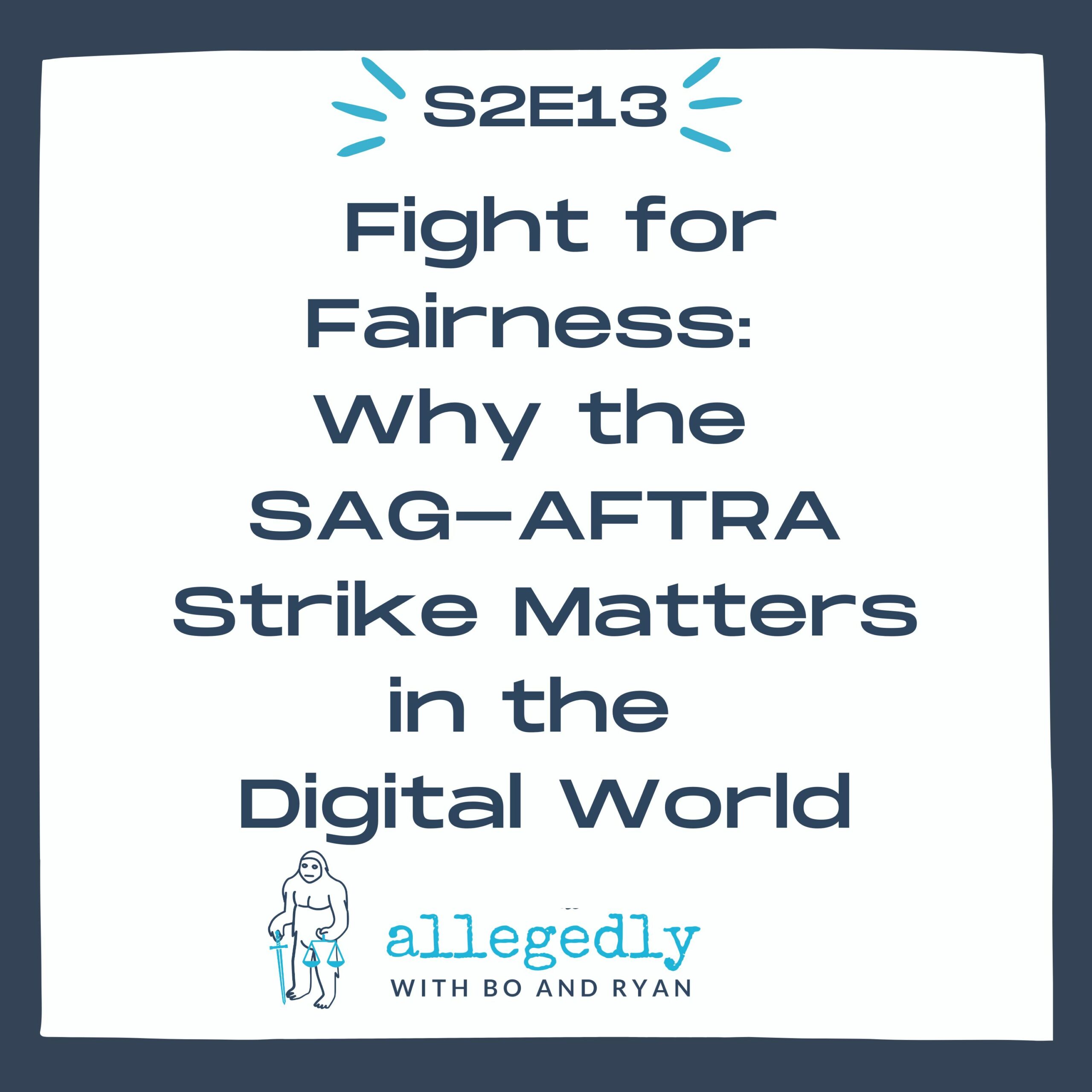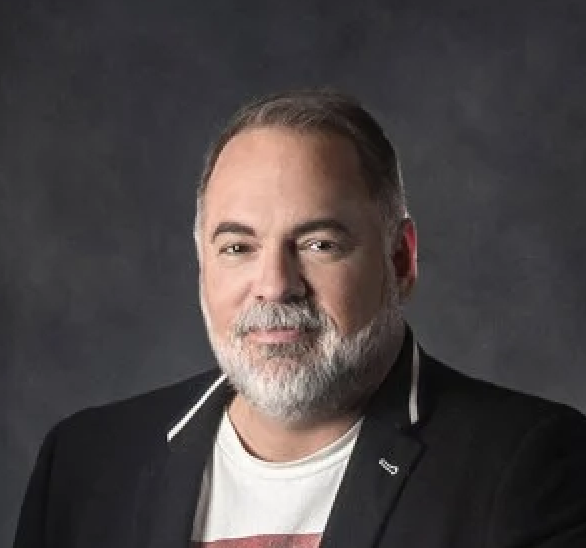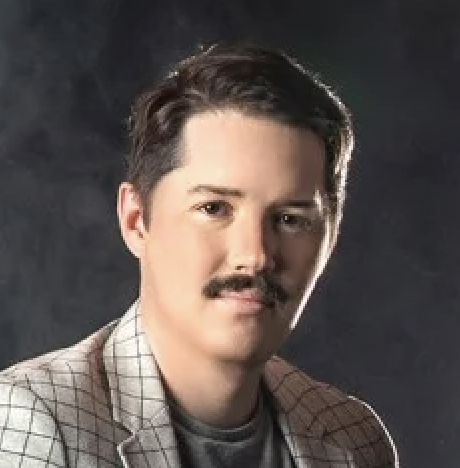allegedly with Bo and Ryan | Season 2 Episode 5
Allegedly… with Bo and Ryan Podcast S2E5| Transcript
Ryan: [00:00:00] There’s like certain arguments that you think about when you’re working on a case. Like, I guess I could say that. And there’s a lot of them that should just end up in the garbage. You know, this is one that probably shouldn’t have seen the light of day.
Ryan: [00:00:13] Welcome to Allegedly with Bo and Ryan, the only entertainment and law podcast that brings you the truth, the whole truth and nothing but the truth… Allegedly.
Bo: [00:00:24] I’m Bo Bowen.
Ryan: [00:00:25] And I’m Ryan Schmidt.
Bo: [00:00:26] And you’re listening to Allegedly with Bo and Ryan. We’re coming to you from our law offices in beautiful, historic Savannah, Georgia, where we’ll be chatting about pop culture, hot legal topics in the news, and doing our best to change the way people think about the law and lawyers.
Ryan: [00:00:43] But first, a little about us. Bo is so legendary, the world’s most respected archaeologist fight over his discarded apple cores.
Bo: [00:00:51] And Ryan is the only person in the world whose organ donation card also lists his mustache.
Ryan: [00:00:59] Together, we are Savannah’s consummate renegade legal titans.
Bo: [00:01:02] And the only corporate and entertainment lawyers in the free world who have never lost a single case…
Ryan: [00:01:09] Allegedly.
Bo: [00:01:10] Well, welcome to Allegedly with Bo and Ryan. Well, Ryan, we’re very lucky to have you back with us today, just right in the nick of time for the show.
Ryan: [00:01:19] Well, it’s good to be back.
Ryan: [00:01:21] As you know, I’ve been out of the country for the last two weeks, but it was an amazing experience.
Bo: [00:01:27] Won’t you give us a little rundown? How’d the trip go?
Ryan: [00:01:30] Yeah, it was great. So we first went to Amsterdam to support my brother in law in the Heineken race, which marks the start of the Dutch rowing season. And he did great in it. He came in second out of his age-class and 15th overall out of about 100 boats.
Bo: [00:01:48] Wow, That’s pretty amazing.
Ryan: [00:01:49] Yeah. And it didn’t it didn’t hurt that they also supplied us with free Heineken. So that was great. And then from there, we went to Munich, spent about a week there, and got to practice my German and also partake in some very good German beer. So that was good. And then we actually got to see the tallest peak in Germany, the top of the German Alps, which was fantastic. It was amazing.
Bo: [00:02:17] Wow, that’s awesome. I remember way back, back in 2001 when I was in Amsterdam. It seemed like every bar–and you can tell me if it’s still like this–every bar had either Heineken or Amstel, like a sign over the top. So you knew it was either a Heineken bar or an Amstel bar?
Ryan: [00:02:35] Yeah, that’s still very true. There’s a few others that have come in that are probably like your mom and pop, but it’s a very common thing in Europe for them to be like sponsored by different brewers, just like kind of like how a restaurant here would be like a it’s a Pepsi place or a Coke place. But of course you don’t see it outside highlighted. But yeah, we actually asked a tour guide if there was a big animosity between Heineken and Amstel. And they said 100 years ago, yes, absolutely. You were either in one camp or the other. But they said thanks to mergers and business and stuff, they’re actually owned by the same company these days.
Bo: [00:03:11] Oh, seriously? Well, I remember there were two things I found interesting about that. One is I would have bet $1 million that Heineken was a German beer and not a Dutch beer until I was actually in the Netherlands. And then the other one was I had never had an Amstel before, only Amstel Light. I don’t know that you can even buy just a straight Amstel in the US.
Ryan: [00:03:33] That’s a good point. Yeah. It’s always been Amstel Light, right?
Bo: [00:03:36] Every time.
Ryan: [00:03:38] Interesting. So then from from Munich we went over to to London and we spent a few days there. It was a mob scene. Oh, my God.
Bo: [00:03:46] Oh, yeah. Was it crowded?
Ryan: [00:03:47] It was so crowded. It was like the beginning of European spring break.
Bo: [00:03:51] Oh was it? They just heard Ryan Schmidt was coming to town. Right?
Ryan: [00:03:55] Right. It was funny. We stayed in Piccadilly Circus in the heart of the theater district. And there was just a bunch of different street performers like right outside of our our hotel. So we were on the second floor. We could see right into the Piccadilly Circus and all the street performers immediately right there. And there was like a little rotation, probably like every hour or two a different person. So you had a singer, then you had a magician, then you had some other beatboxer. Then it kind of would rotate again and again and again. And I remember the first time thinking like, that guy is terrible. That guy’s pretty good. That guy is really good. But like, by the third time of hearing and seeing people’s shows, I’m like, everybody’s terrible.
Bo: [00:04:40] Well, how many times did the crowd get treated to Ryan Schmidt Busker?
Ryan: [00:04:44] Oh, zero times. I heard that it’s very, very strict to even get a permit to perform in London which makes sense I guess. They’re protecting the local artists and stuff like that. I actually saw some real drama when we were there because this guy was doing his beatboxing performance and there was a group of kids kind of off to the side of his little huddle of audience watching his show who were doing this like choreographed TikTok video. So they had brought their own boombox and they were doing this dance and doing this thing to to make this post like: oh, we’re in this huge populated area, we’re making this big post and everybody’s here to see us. Well, as you can imagine, the Beatboxer gets pretty pissed because like the eyes that are being drawn away from him as a career performer who needs the tips for these kids to make these these little videos. And it got it got heated. He stops his performance and jumps in the middle of their like, dance and starts dancing with them and just completely destroys their video, like ruins it. And the whole crowd is like: Yeah!
Bo: [00:06:04] That’s amazing. So forget Biggie and Tupac. We’re talking beatboxer versus TikTok.
Ryan: [00:06:11] Exactly. Exactly. It is tough on the streets. I mean, maybe a similar ending. Hopefully not.
Bo: [00:06:17] So what do you think was your favorite part of the whole trip?
Ryan: [00:06:21] Oh, man, I just love Germany and going to the hofbrauhaus, you know, the beginning of where Oktoberfest starts, you know, you can’t beat being in a beer hall that’s existed for 700 years. It’s just awesome.
Bo: [00:06:38] Wow. That is cool. Well, I’m glad you’re back in time for us to do our next episode. And, you know, I was thinking that it’s time we weighed in on a subject that has dominated the news as well as our own office’s water cooler for the past year. The Alex Murdaugh murder trial.
Ryan: [00:06:59] Oh, no kidding. Yeah. No matter where I go, the second people find out I’m a lawyer, they immediately want to know my thoughts on the case. I’m sure that’s probably your experience, too.
Bo: [00:07:09] Absolutely. It’s like, you know, “Do you think he did it? What did you think of the trial?” So, you know, I thought maybe we could take some turns, kind of giving out our thoughts, maybe some lessons we learned from the trial or some kind of some of the important takeaways, what we thought were some of the most important evidentiary points that came out. If there’s anybody listening that’s not familiar with the case, Alex Murdaugh was a lawyer from a very influential family in South Carolina that was accused of killing his wife and son in cold blood; horrible murder. Recently, he went to trial, got convicted of murder in a trial that was broadcast live all over the world, got sentenced to two life sentences consecutively. Which brings me to lesson number one. Okay. Most particularly if your last name is Murdaugh, maybe don’t go to trial for killing someone if your last name already sounds suspiciously like murder.
Ryan: [00:08:17] That’s a good point. That makes me think of an episode in “The Office” where Dwight’s saying that ‘R’ is the most menacing sound and letter of the alphabet. And he said that’s why it’s called murder and not muktuk.
Bo: [00:08:31] I like it.
Ryan: [00:08:32] Well, the trial also confirmed one of the very first things you were ever taught as a lawyer; this goes back to law school. It’s almost never a good idea to put your client on the stand if he or she is actually also the criminally accused.
Bo: [00:08:48] Oh, absolutely. I mean, that’s Law School 101 right there.
Ryan: [00:08:51] So after months of denying he was anywhere near the place his wife and son were killed, Alex Murdoch decides to take the stand and admit he’d been lying about that, among other things. I mean, he probably felt he had no choice, given that his voice could be heard in a video taken there just moments before the murders. But almost nobody seems to think his testimony helped him, including, most importantly, the jurors.
Bo: [00:09:15] No, they did not.
Ryan: [00:09:17] Which probably explains why it only took 45 minutes to convict him in a case where the prosecution had no murder weapon, and so far as I can tell, no good theory of motive.
Bo: [00:09:28] No, I think you’re absolutely right. I mean, motive and the lack of a motive was a big theme throughout that whole trial. But I have to believe the fact that Murdaugh was a trial lawyer had to play into his negative impression with the jury. I mean, he himself probably thought, you know, ‘I’ve handled many trials. I’ll be so believable, I’ll be able to convince the jurors to be on my side.’ Well, I don’t know if you heard any of the actual interviews with the jurors after the trial, Ryan, but one of them said that Murdaugh came off as, “a big liar” and partly because his answers seemed too quick and too rehearsed. The juror said something like, you know, ‘he already knew exactly what he wanted to say.’ I mean, he is a lawyer.
Ryan: [00:10:22] Fair enough. You mean he would, in addition to his legal counsel, he’d have the skills to anticipate the types of questions that were going to be asked and formulate a perfect response. But even if that was truthful, you run the risk of it sounding too canned and too insincere.
Bo: [00:10:41] Yeah, I have to believe that he sat there and rehearsed–probably multiple times–exactly what he wanted to say. So, you know, any time you do that, unless you are a world class speaker, it’s going to come It’s going to sound like it’s rehearsed.
Ryan: [00:10:59] Yeah. I mean, the jurors expected it to be practiced and polished, but you don’t want to give them a reason to not believe you, right?
Bo: [00:11:07] I mean, I’m just thinking about it. I mean, you’re sitting there as a juror and before he even says a word, you’re thinking, ‘okay, this guy’s a lawyer. I know whatever he says he’s going to have already prepared it.’ So you’re already sitting there looking for a reason not to believe him. You know, that’s not a good place to be, as the defendant.
Ryan: [00:11:28] Right. So especially especially when you’re the defendant and say, ‘let me take the stand.’
Bo: [00:11:34] Yeah, exactly. So, I know we both followed the trial pretty closely. So let’s talk about what we thought were some of the most important moments or kind of turning points in the trial. To me, the single most important factor in the case was when Murdaugh had to admit that he was at the murder site.
Ryan: [00:11:56] Right.
Bo: [00:11:57] Okay You just said it before. Murdaugh had repeatedly told the police that he didn’t go with his wife and son to the dog kennels, where they were murdered. His initial alibi purported that he stayed in the house where he said he took a nap before leaving to go see his sick mother. But in court, witnesses identified Murdaugh’s voice in a video taken by his son at the murder scene just minutes before investigators said the shooting started. So when he took the stand, he obviously still insisted he didn’t shoot his wife and son, but he had to acknowledge that he had lied to investigators about his whereabouts and that that’s a pretty tough thing to recover from.
Ryan: [00:12:45] That’s a hole to dig yourself out of for sure. And I thought another really key part of the trial was the fact that, by taking the stand, he gave up his right to remain silent and the prosecutors got to cross-examine him about his lies. And I think they did a great job. You know, every time they hammered him, Murdaugh could only admit that he lied about being at the scene and say he was sorry that he did that. Even as excuses as to why he lied didn’t exactly help him, I don’t think. I mean, he tried to justify the fact that he lied by talking about his opioid addiction, his distrust of state investigators, and his growing suspicions as police swabbed his hands for gunpowder residue and asked about his relationships with the family. But the prosecutor, Creighton Waters, jumped on him immediately. He emphasized that the body cam footage, showed that Murdaugh lied to the sheriff’s deputies from the absolute first second they walked through the door. The very first thing he said, in fact, was that he hadn’t seen Maggie and Paul, his wife and son, in the 45 minutes before he left to see his mother. The prosecutor just hammered home the point that– once a liar, always a liar.
Bo: [00:13:55] Yeah, you’re absolutely right. I mean, I thought the prosecutor really did a great job in the trial, particularly on cross-examination. He was very good. But, you know, honestly, Murdoch’s defense lawyers actually made some really good points, too. And there were a lot of people coming up to me that were like, ‘you know, I don’t know. I don’t know if he did it or not,’ which shows you the defense did a great job. Taken as a whole, we’ll go through some of the evidence, but where I thought the defense really did a great job was when they started talking about how the physical evidence was repeatedly mishandled at the scene by the investigators and the law enforcement. One of the central contention, Murdaugh’s defense team made was that sloppy police and forensics work undermine the evidence against him. And I had to say I thought they were pretty convincing.
Bo: [00:14:56] Yeah. I did, too.
Bo: [00:14:57] Honestly. I mean, they they talked about the fact that numerous vehicles and people were allowed on the property for hours after the killings, including many of Murdaugh’s relatives and friends. And on a night where there was misting rain and drizzle, Paul and Maggie’s bodies were covered by sheets instead of by tarps. And his lawyer talked about, you know, as more and more people just kept piling in and contaminating that crime scene, there was no one there keeping cars away. Even the first responders just ignored the crime scene tape. People may not know this, but the crime scene scene tape that you put up is there for a reason. It’s to keep people from going inside it so forensic investigators can go in and complete their investigation to keep the crime scene completely clean. But those first responders ignored it and they were just walking all around and touching things and picking up things all inside that taped off area. The defense attorney even talked about water dripping from the kennel roof directly onto Paul’s body. I mean, obviously, it doesn’t mean Murdaugh wasn’t actually guilty, but he did make some great points about how poorly the crime scene was handled by law enforcement.
Ryan: [00:16:23] Oh, absolutely. I mean, this wasn’t A-plus police work. Right. And I thought his closing argument was pretty good, too. He came right out and accused the investigators of actually fabricating evidence. He talked about the fact when investigators finally sent the big group of Murdaugh’s friends and family’s away from the crime scene, they didn’t send them home, and said they were told to just go wait inside the house, which could have easily been part of a crime scene.
Bo: [00:16:51] Well, absolutely. I mean, he could have taken his clothing, his the guns, anything, inside the house. And he’s like, yeah, just go wait in there.
Ryan: [00:16:58] It was unbelievable. And in fact, some of them even started cleaning up the house while they were in there.
Bo: [00:17:04] Crazy.
Ryan: [00:17:05] And then the next morning, Murdaugh asked the family housekeeper to completely scrub the house. She testified that the house had no crime scene tape and she washed a towel and khaki pants she found on the floor. Investigators came inside while she was there, and she said that they didn’t even question her about it. So despite a very large and complex crime scene, investigators released this home back to the family the morning after these murders.
Bo: [00:17:31] That’s crazy.
Ryan: [00:17:32] And Murdaugh’s brother even testified that he cleaned up parts of Paul’s remains that were still sitting in the open. So it wasn’t a shining day for law enforcement by any stretch of the imagination. He did a great job showing that the investigation was not handled very professionally at all.
Bo: [00:17:51] No, I completely agree. But, you know, that, however, was kind of the shining moment for the defense. I mean, everything else kind of went the prosecution’s way. And I thought that the prosecution’s case was simply rock solid. It was so much stronger. Not only did you have Murdaugh himself on the stand admitting that he lied, but I actually thought another very key point of the trial was when it came out that Alex Murdaugh had actually asked his wife to come to the house that night. He had actually drawn her there. She was not there already.
Ryan: [00:18:32] Wow.
Bo: [00:18:32] Maggie Murdaugh’s sister testified that Maggie had called her in the late afternoon on the day she died. She said that Maggie told her she was relaxing in their other home. They actually had two houses in South Carolina. They had one in nearby Edisto Beach, I think. And she was not planning on seeing her husband at all that night. But while she’s on the phone with her sister, she said that Alex called her and said that he was very upset about the fact that his mother was sick. And she he really needed her to come to the house to support him. And Maggie’s sister said that she told her, ‘look, you know, if he needs you, you know, go be with him.’ And that was the last time the sisters ever spoke. So that was a pretty powerful moment, not just because of the emotion involved, but kind of that premeditation of it appearing that Alex was intentionally drawing Maggie there to the house with him.
Ryan: [00:19:33] Oh, agreed. It was a very powerful; especially when she said that the whole reason Maggie went to see Alex that night was to support him while he cared for his sick mother. So if that was the case, why would she just stay at the house and not go with him when he went to visit his mother? So Alex was asked about that on the stand and basically said that Maggie had never planned to go with him because, “she didn’t really like to visit my mom.”
Bo: [00:19:59] Yeah. Something didn’t feel right about that.
Ryan: [00:20:02] No, definitely not. I thought some of the sister’s other testimony was very powerful, too. Like when she talked about her conversations with Alex after the murders, she said he was focused on a completely different case, a fatal boating accident in which Paul was criminally charged. And it struck her as very odd.
Bo: [00:20:24] Oh, yeah. I remember that.
Ryan: [00:20:25] She testified that he came right out and said that his number one goal was to clear Paul’s name. And I remember her voice cracking when she said, ‘I thought that was so strange because my number one goal was to find out who killed my sister and Paul.’
Bo: [00:20:42] Oh, for sure, man. I mean, really, your wife and son just got murdered. And you’re like, Yeah, but we got to get to the bottom of this boat accident. Not the murder of your wife and son. I mean, yeah, that definitely did not sit right with the jurors or many people watching. That was hard to watch. Definitely did not reflect well on Alex. Well, on the evidence side, here was another piece that I thought was was really damning evidence. Okay. There’s been much made about the fact that almost all of the evidence, if not all, was circumstantial in this case. It was no video of him, you know, or any eyewitness of him actually committing the murders. But the prosecutor, I thought, did an amazing job arguing that it was a family weapon that was used to kill Maggie, and not just some stranger or hit man coming on to the scene as Alex tried to claim. The murder weapons were never found, but the gun used to kill Maggie was identified as a 300 blackout assault-style rifle. And a 12 gauge shotgun was used on Paul. But I think the blackout rifle was the key to the conviction. I really do. Now, a blackout rifle got mentioned repeatedly during the trial and ballistics experts testified. You know how like they can look at marks on shell casings and then match it up to see if another bullet was fired from that same gun?
Ryan: [00:22:18] Yeah.
Bo: [00:22:18] So, they found that the marks on the rifle shell casing from the murder scene exactly matched marks found on older casings found in other areas around the house.
Ryan: [00:22:32] Oof.
Bo: [00:22:32] You know, obviously indicating that these other shots that were older had been fired by the same gun. Well, it also came out during the trial that the Murdaugh family had two custom blackout rifles: one given to Paul and one given to his brother, Buster, as Christmas presents. Paul’s rifle apparently had disappeared. No one could find it after the murder. So, again, not a good look for Alex.
Ryan: [00:23:03] No. Not at all. And the prosecutors did a great job of refuting some of the defense arguments that were made at the trial. The defense tried to claim that Alex was too tall to have fired the shots that killed Paul. But the prosecution showed very effectively that this argument had no merit. It’s hard to fire a shot from a higher angle than you are capable of reaching, but it’s pretty easy to fire on from a lower angle. For example, you could do one of two things: you could crouch or you could kneel.
Bo: [00:23:33] Or put your hands lower down.
Ryan: [00:23:39] Right. For sure. The state’s final rebuttal witness, forensic expert Kenneth Kinsey, testified that the defense theory that the gunman had to be shorter than Alex was preposterous.
Bo: [00:23:48] Yeah. I completely agree. That was that was almost silly. You know.
Ryan: [00:23:54] Like there’s like certain arguments that you think about when you’re working on a case. Like, ‘I guess I could say that.’ And there’s a lot of them that just that should just end up in the garbage. You know, this is one that probably shouldn’t have seen the light of day for sure.
Bo: [00:24:09] Well, there was another key piece of evidence that reminds me of. The jurors, at one point during the trial, watched a short Snapchat video that Paul had taken. Just probably like ten minutes before the murders. And it showed his father wearing a blue shirt and long khaki pants. Maybe it was a little more, maybe like an hour before the murders. Okay. So, those clothes, the blue shirt, long khaki pants were never found, which, again, looks pretty bad for murder. There was also some testimony from his housekeeper that two months after the murders, he tried to convince her that she that he was wearing a completely different outfit that day. But she testified that she distinctly remembered the blue shirt and khaki pants because she had actually helped him straighten his collar that day. The implication, of course, being that Murdaugh was trying to manufacture evidence or suborn perjury, basically.
Ryan: [00:25:18] Yeah. Another strike against Alex. I mean, modern technology also played a role in this trial as well. The prosecution used Murdaugh’s cell phone and GPS data to point out inconsistencies in his story and Murdaugh’s cell phone data showed that his phone was sitting immobile at the house at the time of the murders. But then, immediately after the murders took place, it showed a burst of high activity and movement for about four minutes. Murdaugh couldn’t give a good answer, only saying that he was getting ready to go to visit his mother.
Bo: [00:25:52] Yeah,
Ryan: [00:25:53] Said, ‘I always get a little frantic before I visit her.’ Even wilder, during the trial itself, General Motors produced OnStar data from his Chevrolet Suburban. The vehicle records showed that Murdaugh sped down rural roads on that nighttime trip right after the murders, reaching speeds of up to 80 miles an hour, far above the posted speed limits. He also drove past the exact spot on the roadside where Maggie’s phone was later found.
Bo: [00:26:24] Ouch. Yeah, that’s not a good look. So, I mean, the implication obviously being he threw the phone out the window.
Ryan: [00:26:31] Of course.
Bo: [00:26:31] Well, there was also a key inconsistency in the trial. When Alex Murdaugh said that when he went to his mother’s house, his mother was awake. Okay? But her caregiver testified that his mother was sound asleep. The caregiver also said that he stopped by that night for only, at most, about 20 minutes, but that Murdaugh later went to her and tried to convince her again to say that no, it was more like 30 or 40 minutes at least. She testified that it made her very uncomfortable. The fact that he was pressuring her like that. So even more crucial, I think, though, was that she also testified that she had never once seen Murdaugh visit his parents home at 6:30 in the morning ever. But she said that’s exactly what he did just a few days after the shootings. And she said he walked in 6:30 in the morning carrying what looked like to her some kind of like blue vinyl tarp that was bundled up as if it was carrying something or something was inside it. Well, investigators got get a search warrant. Inside the house, they find this vinyl blue raincoat with gunshot residue on the inside of it, leading to speculation, of course, that it had been wrapped around a recently fired weapon.
Ryan: [00:28:02] My God. Yeah. And when you stack it all up, the evidence against Murdaugh was very convincing. The final nail in the coffin, though, had to be when the judge decided to allow prosecutors to present evidence that Murdaugh had stolen huge amounts of money from his law firm, clients and friends. Several of his former colleagues described him as just an overall dishonest guy.
Bo: [00:28:25] Oh, yeah. You’re absolutely right. And this was not, you know, somebody taking a few thousand dollars. This was a millions. I think it was like $95 million over years or something.
Ryan: [00:28:37] To fuel like a $50,000 a day cocaine addiction or something like that.
Bo: [00:28:42] It was just crazy. I mean, it certainly was not endearing to the jury, you know, for sure. But, that was really bad testimony for him just by the facts itself. But it also at least gave the prosecution some evidence of a possible motive. I don’t think a great motive, and I still don’t quite understand what his motive would have been. But … It turned out that the fact that he was stealing all this money from his clients had come out just very recently before the murders. It had just been discovered. Now it’s flimsy, but you could certainly argue that he was hoping that the sympathy that he would garner for the loss of his wife and son would then outweigh the scrutiny he knew he was going to be under for stealing from his clients.
Ryan: [00:29:41] I imagine that the fight to keep that evidence out–testimony of these prior bad acts–that was probably the biggest fight pre-trial. And, you know, certainly hurt hurt the defense quite a bit when it came out. Remember when his paralegal testified that when she discovered the theft, it really hit her hard. She testified that she realized that she never really knew him, and that he had been lying to everybody.
Bo: [00:30:10] Yeah.
Bo: [00:30:10] I mean, and it didn’t help Murdaugh that the prosecutor really did a great job of drawing that part of the case out; reciting the names of each and every client and making sure Murdaugh had to admit that he had stolen from each and every one of them. So, while there were a few problems with the prosecution’s case, the evidence against Murdaugh really was extremely convincing. I think it was definitely the right verdict.
Ryan: [00:30:44] You mean kind of like how calling the Bowen Law Group is always the right decision if you have any corporate or entertainment law needs.
Bo: [00:30:50] Exactly, Ryan. Which is why we are, of course, the most successful lawyers in the history of human jurisprudence … Allegedly.
Ryan: [00:31:00] That’s our show for today. Thanks for listening to the legal mastery of the highly intelligent and easily most attractive true legal outlawyers in Savannah. And remember the only lawyers in the free world who’ve never lost a single case … allegedly. To continue to receive free edge-of-your-seat legal anecdotes, mind blowing takes on hot topics, and a general masterclass in awesomeness, please head over to bowenschmidt.com/podcast …
Bo: [00:31:22] And look dude, I think they get it. If they haven’t hit subscribe by now we find you guilty as charged.














